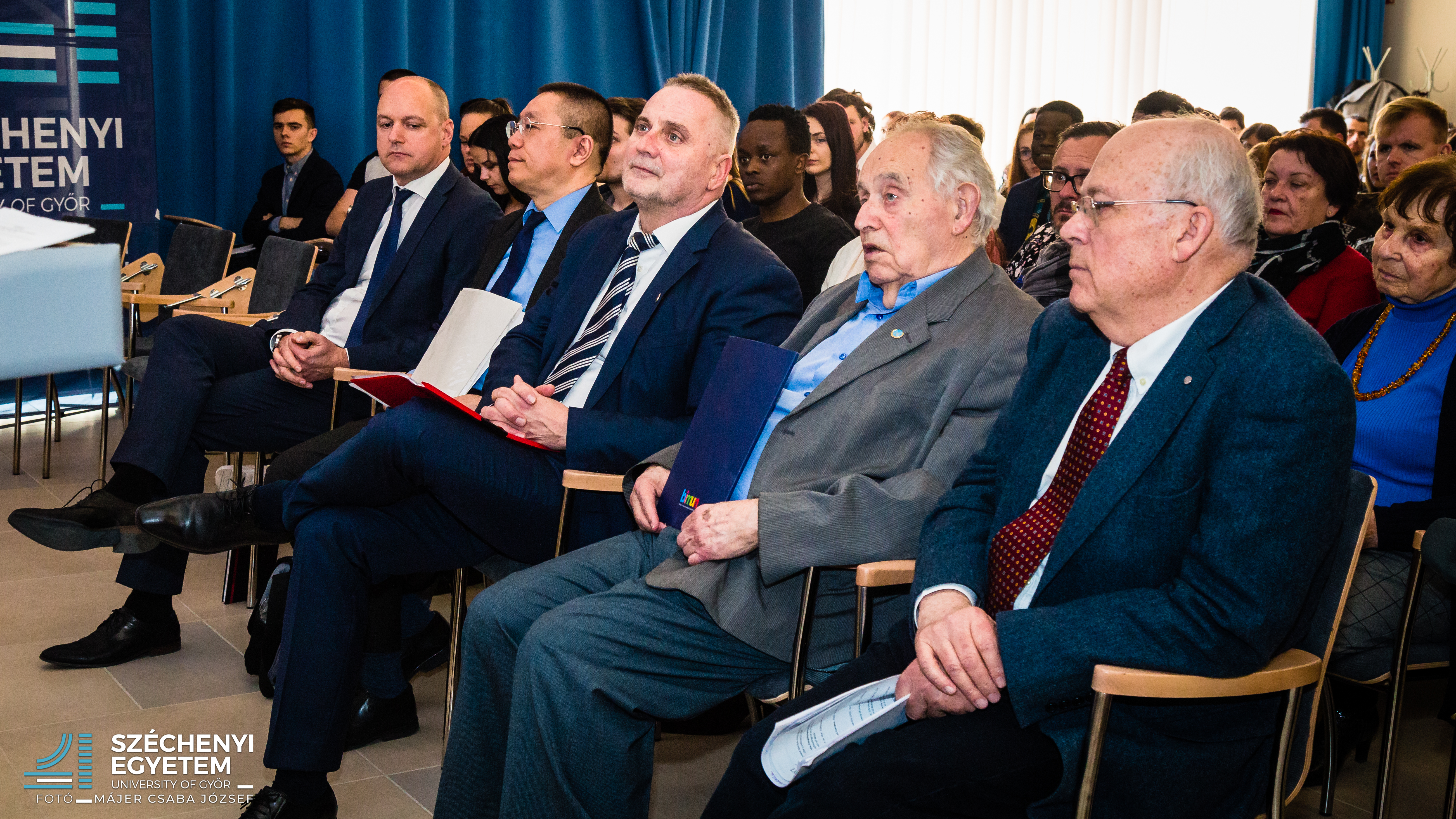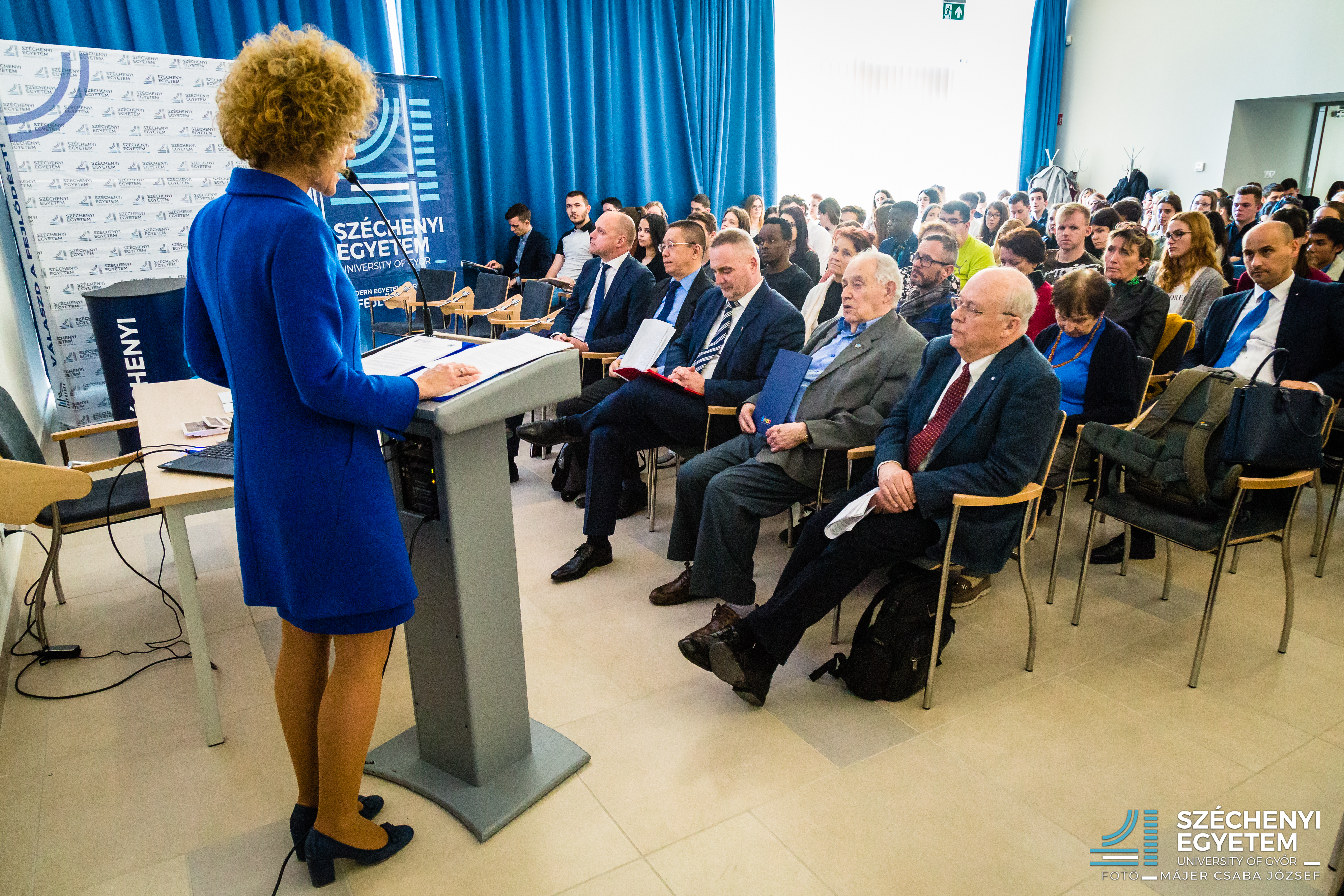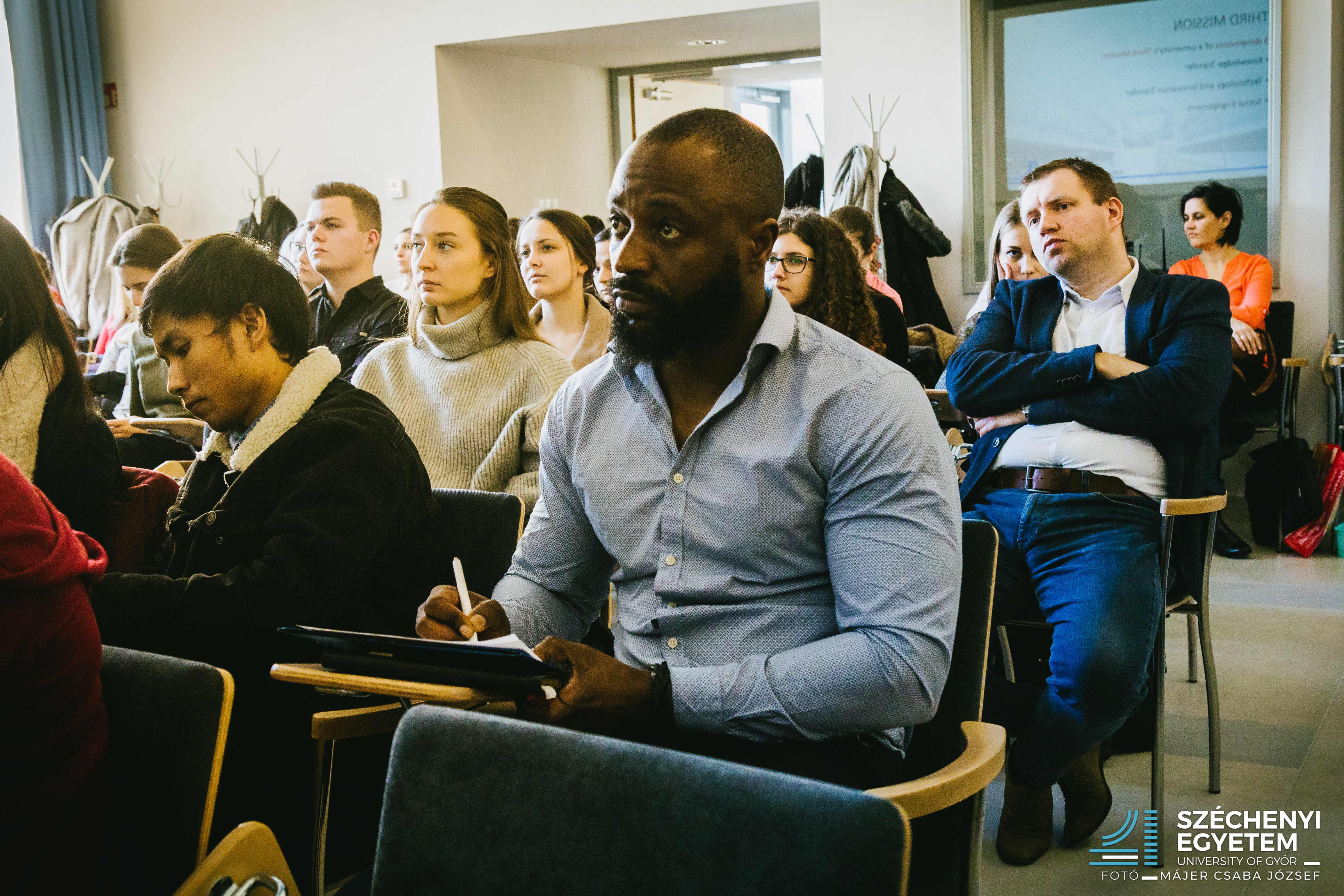CONFERENCE ON THE FUTURE OF WORK HELD AT SZÉCHENYI ISTVÁN UNIVERSITY
CONFERENCE ON THE FUTURE OF WORK HELD AT SZÉCHENYI ISTVÁN UNIVERSITY
in cooperation with UNA-H to mark the Centenary of The International Labour Organisation
“The Future of Work and the Employment of the Future” -
The potential consequences of the Fourth Technological and Third Information Revolution in the World of Work
12th March 2019
Having welcomed guests and participants to the Conference, Dr Eszter Lukács, Vice-Rector for Educational Affairs at Szechenyi István University, as moderator, proceeded to introduce the guest keynote speakers: Dr Péter Földesi, Rector of Széchenyi István University; Professor Mihály Simai, Academician, The Hungarian Academy of Sciences and President UNA-H; Mr Kenichi Hirose, Senior Social Protection Specialist, ILO Decent Work Technical Support Team and Country Office for Central and Eastern Europe; Dr Csaba Makó, Research Chair, Hungarian Academy of Sciences and Dr Dániel Feszty, Senior Manager within Development Total Vehicle, AUDI HUNGARIA Zrt., and Head of Department, Department of Whole Vehicle Engineering, Audi Hungaria Faculty of Automotive Engineering, Széchenyi István University.
Professor Földesi’s paper, “Universities’ third mission – local & global contexts” emphasized the increasing recognition of the importance of a University’s mission to serve the society in which it lives. Via transfer of knowledge and technology transfer, together with a firm commitment to social engagement, HEIs create partnerships with business and industry at local, national and global levels as well as developing diverse forms of collaboration with civic organisations and defined societal target groups. He elaborated how Széchenyi István University is striving to fulfil its commitment to the third Mission: from the promotion of STEM subjects to school pupils at Mobilis to university lectures for the third age from careers advice services through alumni career tracking to the expansion of internship opportunities with local industry partners from the dynamic expansion of facilities to support the burgeoning international student body to the organisation of major cultural and educational events.
Professor Simai opened his speech on “The future of work in the transforming global system” by characterizing the present era as the fourth industrial-technological revolution. Having defined the essential components of this new revolution, he predicted that the majority of the associated technologies will be both disruptive and transformative. These will have much broader implications than in previous waves of technological change. Professor Simai stressed that it is as yet unclear to what extent these new technologies will complement rather than replace jobs. What is evident is that technological changes are spreading at a greater pace than in the past. In addition, the implications of such changes will be long-term. Stressing that adaptation to the changes will be much more difficult than in the case of the past, he went on to categorize the requisite policies which governments and the business world will need to make. He sees here a major role for the ILO in helping the development of such policies. The Professor went on to discuss the probability of job replacement by new technologies and quoted an estimate of 40%-60% for Europe, characterizing such changes as simultaneously disruptive and creative. Professor Simai concluded his presentation with a consideration of the importance of education in the process of technological changes, especially at the tertiary level. In the fourth industrial-technological revolution, Universities have the greatest role to play in directing students’ attention to the changes due to occur in the next 30 to 40 years.
In his presentation, “The problems of youth employment”, Mr Kenichi Hirose reflected Professor Simai’s views when he warned that, because of technological change, the future labour market would feature both negative and positive aspects. He noted that while certain trades may be displaced, new employment possibilities will be created. He emphasized how regular employment will not be guaranteed in the future. However, it is likely that for non-standard employment work, conditions will improve. As a solution, Mr Hirose foresees the necessity of a human-centred agenda for the future of work, which means investing in people’s capabilities, in labour institutions and in decent and sustainable work.
Following a brief historical overview covering both optimistic and pessimistic views of the effect of technological changes on labour, in a presentation entitled “Automation Anxiety and Quality of Job in European Perspective”, Professor Makó opined that automation will affect all occupations, although few of them will completely cease to exist. Proceeding to catalogue the diverse risks of automation, he subsequently presented a comprehensive comparison of the types of work undertaken within a selection of EU states. He went on to highlight the need to renew the governance of innovation policy, also emphasizing the importance of strengthening public awareness of Artificial Intelligence. In the final analysis, he documented the numerous challenges awaiting future research.
Dr Feszty began his presentation, “The training and employment of young engineers at Audi Hungaria”, with a description of the Audi Hungaria factory in Győr, going on to provide statistics about the number of employees. He continued by describing the four main activities of the company - engine manufacturing, vehicle manufacturing, tool manufacturing and technical development - giving detailed statistics of each activity. Moreover, he emphasized the fact that Audi Hungaria is the largest engine manufacturer in the world. Having given an overview of the customers of engine production, Dr Feszty proceeded to describe the four segments of vehicle production, subsequently giving details of all the vehicle products. He also covered the role of Technical Development, Engine Development and Vehicle Development.
Moving on to training issues, Dr Feszty highlighted the fact that, supported by the Audi Hungaria Zrt Company, it is now possible to obtain a quality education right from kindergarten through elementary and high school (at the Audi Hungaria General Education Centre) to Higher Education level programmes in the Audi Hungaria Faculty of Automotive Engineering at Széchenyi István University. He then went on to describe the system of engineering training at Széchenyi University, giving details of the departments at the Audi Hungaria Faculty, also touching on Research and Development at the Department of Whole Vehicle Development. In addition, he revealed particulars of the Experiential Learning Programme. Dr Feszty concluded his presentation by giving encouraging statistics on the volume of young engineers – both interns and engineers – employed at Audi Hungaria.
Following the keynote presentations, there was an opportunity for panellists to react to and comment on each other’s speeches, as well as for members of the audience to put questions to the panellists, resulting in some lively exchanges between the panel and the student participants.
The event, planned to mark “The ILO Centenary” (International Labour Organization 100), enjoyed the support of the Prime Minister’s Office.
 |
 |
 |











